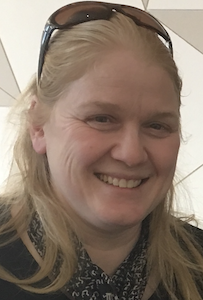Mathematics

Dr. Gizem Karaali, Professor of Mathematics, Pomona College
NOVEMBER 2023
Abstract: In 1960 Eugene Wigner wrote a now-famous article titled The Unreasonable Effectiveness of Mathematics in the Natural Sciences. In 1993, the homophonic quotient groups for French and English (the quotient of the free group generated by the French (respectively English) alphabet determined by relations representing standard pronunciation rules) were explicitly characterized. In this talk, we will explore the mathematical and philosophical connections between these two works. Mathematically I will describe how my colleagues Herbert Gangl, Woohyung Lee (PO'15) and I, native speakers of three quite different languages, applied the methodology proposed in 1993 to our three language systems: German, Korean, and Turkish. Our results point to some interesting differences between these three languages (or at least their current script systems). An overview of the algebraic theory of languages will be included, as well as a philosophical discussion of the implications of these results.
The 23rd Annual Schraut Memorial Lecture Is being held in conjunction with the Undergraduate Mathematics Day. More about this event >
Why do we hold the Annual Kenneth C. Schraut Memorial Lecture?
This lecture is held each year in honor of Dr. Kenneth C. Schraut. It is funded entirely from alumni contributions.
Kenneth Charles Schraut was a professor of mathematics at the University of Dayton for over 50 years. He was born May 19, 1913, in Hillsboro, Ill., and received his bachelor's degree in mathematics in 1936 from the University of Illinois. He earned a master's degree (1938) and a Ph.D. (1940) from the University of Cincinnati.
He taught full-time at UD from 1940-78 and continued teaching part-time from 1978-93. Schraut was chair of the Department of Mathematics from 1954-70 and founded a summer institute for high school mathematics teachers on campus. He taught math classes to business and pre-medical students, along with algebra, trigonometry, calculus and advanced engineering mathematics. Schraut established the UD chapter of Pi Mu Epsilon (National Mathematics Honor Society) and was an advisor for premedical students.
Among his most notable accomplishments was his pioneering work with what became the University of Dayton Research Institute. In 1949, Schraut and 10 students received a $10,200 contract from Wright-Patterson Air Force Base (WPAFB) to analyze or "reduce" aircraft flight load data. This project, which became known as Project Globe, was followed by a second data reduction contract for $25,000. From 1951-52, Dr. Schraut directed the expansion of research efforts at UD. In 1952, he began Project Delta, recruiting full-time professional researchers for nuclear weapons effects research. From these beginnings, sponsored research at UD grew to $1 million by 1956, and, Sept. 1 of that year, the University of Dayton Research Institute (UDRI) was formally established.
Dr. Schraut's civic and professional activities included the American Math Society; the Math Association of America; the American Society for Engineering Education, for which he was chairman of the Math Division; the American Association of University Professors; the Metropolitan Dayton Honors Society; and the National Science Foundation Summer Institute, which he directed in 1959 and 1961-67.
The UD Libraries retains a collection of Dr. Schraut's papers. Learn more >>
2022: Chris Cabanski, Parker Institute for Cancer Immunotherapy, Breaking All The Rules You Learned in Statistics Class
2021: Suzanne Lenhart, University of Tennessee, One Health: Connecting Humans, Animals and the Environment
2019: Tommy Ratlif, Wheaton College, So How do you Detect a Gerrymander?
2018: Kennon Copeland, NORC, Measuring Flu Vaccination Rates
2017: Joe Gallian, University of Minnesota Duluth, Breaking Driver's License Codes
2016: David Diller, CMDbioscience, A Role for Mathematics in Understanding and Curing Disease?
2015: Chikako Mese, Johns Hopkins University, Riemannian Geometry
2014: Rafe Donahue, BioMimetic Therapeutics, Inc., Data Stories and Pictures: Discovering Lessons and Principles for Statistics and Life
2013: Thomas Bohman, Carnegie Mellon University, Randomness and Pseudorandomness in Combinatorics
2012: Lilian Wu, IBM Technology Strategy and Innovation, Creating Macroscopes with Technology and Analytics: New Possibilities in Our Lives – The Important Role of Tomorrow’s Mathematics Professionals
2011: Jeffrey Diller, University of Notre Dame. Imaginary Numbers, Unsolvable Equations, and Newton’s Method
2010: Eugene Steuerle, The Urban Institute, Every Time I Turn Around There’s Dr. Schraut or You Can’t Take mathematics out of a U.D. Mathematics Major
2009: Thomas Santner, The Ohio State University, These Aren’t Your Mothers and Fathers Experiments
2008: Robert Bolz, Lockheed Martin Corporation, Leadership Founded in Habits of Inquiry and Reflection
2007: William Dunham, Muhlenberg College, An Euler Trifecta
2006: Greg Campbell, Federal Drug Administration, The Role of Biostatistics in Medical Devises: Making a Difference in People’s Lives Everyday
2005: Patrick Flinn, National Security Agency, Gröbner bases: A Natural Extension of Gaussian Reduction and the Euclidean Algorithm
2004: Jane Pendergast, University of Iowa, Beyond Reasonable Doubt: The Role of Statistics in Health Research
2003: Robert Lewand, Goucher College, How not to get lost while on a random walk
2002: Paul Campbell, Beloit College, How to keep up with mathematics
2001: Richard Schoen, Stanford University, Geometry in two and three dimensions
2000: Joe Diestel, Kent State University, Sums and series in vector spaces
